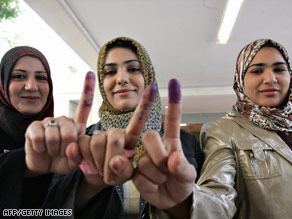Any chance I can use ‘Crazy Karzai’ in the title of anything, is a good thing. lol Now back to the post.
Here is the assessment. I really think Karzai thinks this is his ‘Ace in the hole’. Meaning he was planning on pulling this stupid decree out of his funny hat as a means to push back against this pressure we are putting on him about his crap government. Because at face value, not only is this decree silly, but it will probably backfire on him in a dangerous way.
If let’s say he thought he would get some votes out of this populist move, at the end of the day he still has to deal with the Taliban. He will also have to deal with an entire group of unemployed Afghan security contractors who will probably hop on over to the Taliban out of anger–or just do nothing. He might get some of them to join the army or police. It’s hard to say who goes where, but I do know that this is a big gamble for him politically. And what happens when people get more angry because violence increases due to this massive removal of multiple private security operations across the country?
I also think that this anti-corruption unit is going to go on the offensive during the elections. Karzai’s competition will have plenty of material for firing up the populace and ripping apart the incumbent. This upcoming election is heavy on his mind, and he knows (thanks to Senator Kerry’s shot across the bow’) that we mean business this time. I for one would love to see him voted out of office. Someone needs to hold that office, that both the Afghans and the Coalition forces fighting in that war can believe in…. and possibly die for, in battle.
Below I found all the most pertinent stories to help you out in making your own assessments. From some Afghan security company’s responses to the whole thing, to the details of this last diplomatic mission which freaked Karzai out and forced his hand on this. So at this point, it is all about politics. –Matt
Afghan plan to shut private security firms may endanger convoys
If Afghanistan dissolves security firms, guards will join Taliban, some predict
Karzai Plays to the Crowd with Threatened Ouster of Afghan Contractors
U.S. sends warning to Afghanistan, and John Kerry delivers the message
——————————————————————
Afghan plan to shut private security firms may endanger convoys
By DION NISSENBAUM AND HASHIM SHUKOOR
August 16, 2010
KABUL, Afghanistan — Afghan President Hamid Karzai’s office abruptly announced plans on Monday to close all the country’s polarizing private security companies by year’s end, a decision that could create more risk for the U.S.-led military along crucial supply routes into Afghanistan.
In an announcement that appeared to catch NATO officials by surprise, Karzai vowed to shutter the lucrative network of private security firms.
“The government of Afghanistan has decided that the security companies have to go,” Karzai spokesman Waheed Omar said.
If the president follows through with the short timeline, the decision could strip NATO supply routes of the private forces, which have provided protection for convoys that come under constant attack.
It would force diplomatic missions, including the U.S. Embassy in Kabul, to find some other way to protect their compounds.
It also could create a volatile new pool of disaffected militants, some of whom already are suspected of having links with the Taliban and of staging attacks on convoys that are passing through their areas.
“Security will get worse,” warned Matiullah Khan, one of the country’s more influential figures in the murky security convoy business. “The police can’t provide security in the provinces, so how can they escort convoys?”
The private security industry, a complex network of registered international companies and unregulated Afghan militias, employs 26,000 people working on U.S. contracts, according to NATO officials. The vast majority of them – about 19,000 – work on military contracts.
The companies have come under fire from almost every front.
Karzai long has argued that the firms act as a parallel security force that undermines the nation’s police and army.
Many Afghans fear convoy security guards, who have been accused of wildly opening fire and killing civilians while protecting their routes.
Last month, contractors with DynCorp International were involved in a fatal car crash in Kabul that sparked violent anti-American protests and raised fears that the isolated demonstration could devolve into widespread rioting.
Some of the firms have been accused of using their familial ties to the Karzai government to secure millions of dollars in NATO contracts. Two of Karzai’s cousins run one major security company. The defense minister’s son runs another.
U.S. officials also have expressed concerns over long-standing allegations that the security firms use NATO funds for the contracts to pay insurgents not to attack the convoys.
